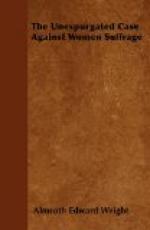But the ethical law demands more than abstention from definitely anti-social actions. It demands from every individual that he shall recognise the precepts of public morality as of superior obligation to those of egoism and domestic morality.
By the fact that her public men recognised this ethical law Rome won for herself in the ancient world spectacular grandeur. By an unexampled national obedience to it glory has in our time accrued to Japan. And, in truth, there is not anywhere any honour or renown but such as comes from casting away the bonds of self and of the narrower moralities to carry out the behests of the wider morality.
Even in the strongholds of transcendental religion where it was axiomatic that morality began and was summed up in personal morality, it is gradually coming to be recognised that, where we have two competing moralities, it is always the wider morality which has the prior claim upon our allegiance.
Kingsley’s protest against the morality of “saving one’s dirty soul” marked a step in advance. And we find full recognition of the superior claim of the larger morality in that other virile dictum of Bishop Magee, “I would rather have England free, than England sober.” That is, “I would maintain the conditions which make for the highest civilisation even at the price of a certain number of lapses in personal and domestic morality.”
What is here new, let it be noted, is only the acknowledgment by those whose official allegiance is to a transcendental ideal of personal morality that they are called upon to obey a higher allegiance. For there has always existed, in the doctrine that guilty man could not be pardoned and taken back into favour until the claims of eternal justice had been satisfied, theoretical recognition of the principle that one must conform to the precepts of abstract morality before one may ethically indulge oneself in the lower moralities of philanthropy and personal benevolence.
The view point from which I would propose to survey the morality of woman has now been reached. It has, however, still to be pointed out that we may appropriately, in comparing the morals of man and woman, confine our survey to a comparatively narrow field. That is to say, we may here rule out all that relates to purely personal and domestic morality—for this is not relevant to the suffrage. And we may also rule out all that relates to offences against the police laws—such as public drunkenness and offences against the criminal law—for these would come into consideration only in connexion with an absolutely inappreciable fraction of voters.
It will be well to begin by signalising certain points in the moral psychology of man.
When morality takes up its abode in a man who belongs to the intellectual caste it will show itself in his becoming mindful of his public obligations. He will consider the quality of his work as affecting the interest of those who have to place dependence upon it; behaviour to those who are casually brought into relations with him; the discharge of his indebtedness to the community; and the proper conduct of public affairs.




